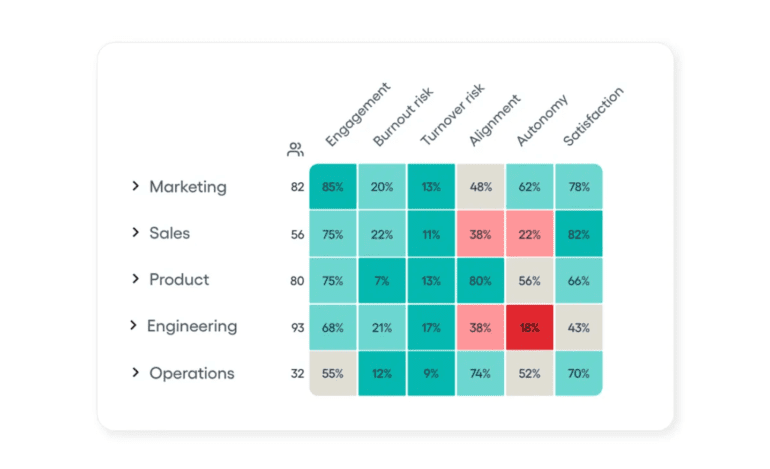TL;DR:
- Erudit secures $10 million in Series A funding led by Conexo Ventures, Athos Capital, Ignia Partners, True Blue Partners, and Fondo Bolsa Social.
- Demand for employee surveillance software surged by 75% in March 2020, driven by the shift to hybrid work during the pandemic.
- Erudit’s AI-driven platform tracks workforce metrics like turnover risk and burnout rate by connecting to popular workplace apps.
- The platform generates real-time scores on key parameters such as “alignment,” “autonomy,” “engagement,” and “satisfaction.”
- Privacy concerns arise as Erudit analyzes private employee messages, despite efforts to anonymize data.
- The platform offers the option to exclude individuals, teams, or departments from monitoring, but questions persist about cultural expression and momentary lapses in judgment.
- Erudit’s growth continues, with “dozens” of businesses using the platform and plans to expand its team.
Main AI News:
The surge in employee surveillance, driven by the pandemic-induced shift to hybrid work models, has ignited a notable uptick in demand for staff monitoring software. According to a recent poll, searches for such software skyrocketed by 75% in March 2020, compared to the 2019 monthly average. This heightened demand continued unabated through 2021 and 2022, prompting startups specializing in workforce analytics and monitoring to thrive.
Today, Erudit, an innovative AI-driven platform focused on tracking key workforce metrics such as turnover risk and burnout rates, announced a significant milestone. The company successfully secured $10 million in a Series A funding round led by prominent investors, including Conexo Ventures, Athos Capital, Ignia Partners, True Blue Partners, and Fondo Bolsa Social.
Erudit’s approach, akin to several workplace surveillance platforms, integrates seamlessly with popular workplace apps like Slack, Microsoft Teams, and Zoom. Leveraging a sophisticated set of AI algorithms, Erudit generates insightful scores across vital parameters such as “alignment,” “autonomy,” “engagement,” and “satisfaction.” This data-driven approach empowers organizations to make informed decisions in real-time without disrupting workflow.
Alejandro Agenjo, Co-Founder of Erudit, emphasizes the power of data-driven decision-making, stating, “Everyone understands that the best decisions are made by those with the best data. But companies today are partially blind because the people analytics industry relies on lagging indicators. Erudit offers the ability to understand what affects the productivity of employees in real-time without disrupting workflow — and without the biases generated by current data collection systems, such as surveys.”
However, concerns linger over potential errors, misinterpretations, and privacy issues associated with software that analyzes employees’ private messages, even if anonymized. A 2021 survey by ExpressVPN revealed that a majority of employees (56%) experience stress and anxiety regarding employer surveillance of their communications.
Erudit attempts to address these concerns by allowing customers to exclude individual employees, teams, or departments from monitoring, though this decision rests with administrators. Yet, it remains unclear whether Erudit’s AI models account for variations in expression across different backgrounds and cultures, a critical consideration to avoid discrimination.
Moreover, momentary lapses in judgment raise questions about whether Erudit would penalize such missteps. The platform’s efficacy aside, employees may rightfully worry about how their managers interpret and act on the data it provides.
In response to mounting criticism, Erudit has published a detailed blog post justifying its platform’s design and functionality. While the company positions itself as a tool that can be used for both positive and negative purposes, debate persists about the implications of such a stance.
Despite these challenges, Erudit has successfully onboarded “dozens” of businesses onto its platform and is poised for expansion. With a team of 20 employees, the company plans to bolster its workforce, particularly in the areas of customer support, customer success, and sales. As organizations continue to prioritize data-driven decision-making, Erudit aims to play a central role in shaping the future of people analytics, business intelligence, and AI.
Conclusion:
Erudit’s successful funding round highlights the growing market demand for workforce monitoring solutions. As organizations embrace hybrid work models, the need for real-time, data-driven insights into employee productivity and engagement becomes increasingly apparent. However, challenges related to privacy, cultural nuances, and data interpretation persist. Erudit’s ability to secure funding and attract business clients suggests a promising future for the people analytics and AI-driven workforce management sector.

